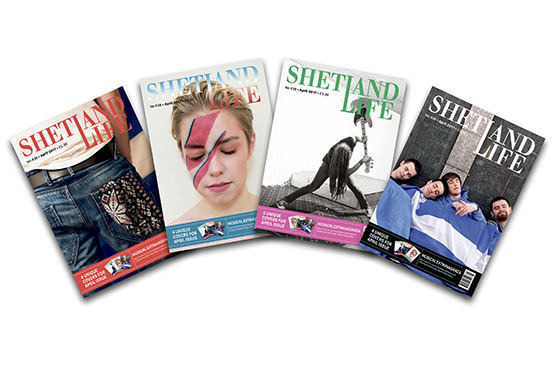Past Life: Cowichan Indians’ debt to Shetland
From Shetland Life, July 1984, No.45
Visitors to Vancouver Island are often struck by the similarities between Shetland knitwear and the garments knitted by the Cowichan Indians (see “Shetland Skills in the Cowichan Valley” by Elizabeth Howden in last month’s [June 1984] Shetland Life). The connection is due to the efforts of a Shetland lady who settled in Vancouver Island a hundred years ago and taught the Indian women the skills that have become a thriving industry today.
She was Jeremina Colvin, who was born at Sandsound on 9th July 1858, her parents being Adam and Janet Robertson. She had a brother, Andrew and two half-brothers, James and Magnus White, her mother being a widow when she married Adam Robertson. As a child she was taught to spin and knit and in 1885 when she emigrated to Canada her spinning wheel was the most important part of her luggage. Her journey ended at Victoria, British Columbia, where she met and married another Shetland emigrant, Robert Mouat Colvin, who had left Levenwick in 1881 when he was 21. He was born at the croft of Uppertoon, his father being Peter Colvin.
The Colvins made their home at Cowichan Bay where they started to clear a farm out of the forest. The Indians there were well disposed to the settlers and a strong bond developed between the couple and their Indian neighbours. As soon as they had cleared a few acres they bought some sheep, choosing a breed with long fine wool suitable for spinning.
Jeremina knitted most of the clothes worn by her children and before long she was showing the Indian women how to knit thick sweaters which would keep their men warm while hunting or fishing. She taught them to knit Fair Isle patterns, then as they became proficient knitters, they added their own patterns such as the Killer Whale and the Thunderbird.
Today Cowichan sweaters are described as almost a uniform among the fishermen, hunters and loggers of British Columbia. Some old timers say that a Cowichan sweater should never be washed since to do so is to remove the natural oils. Others consider that dry cleaning is quite safe.
Robert and Jeremina had six children – Mary who inherited her mother’s spinning wheel, Jemima, Margaret, Edith, Robert and Magnus.
Robert (senior) died in 1926 aged 67. Jeremina survived him by ten years remaining unknown outside the little community and little knowing that the skills she had taught her Indian neighbours would become an important cottage industry which made all the difference between poverty and relative prosperity to many an Indian family.
I am indebted to Mrs Anderson, Mouswell, Tingwall, and also to Mr Bertie Deyell, Semblister, Bixter, for the information upon which this article is based. Editor SL




